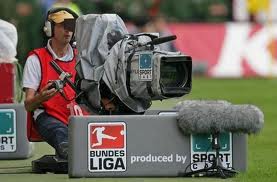By Paul Nicholson
February 11 – The likely shape of Europe’s premium broadcast deals in the future is starting to reveal itself, and it will be a case of evolution rather than revolution.
The Premier League last week announced a pan-Scandinavia 6-year deal with NENT (reportedly worth £2 billion over the term) that will be a mix of the media giant’s free TV and streaming platforms. Premier League chief executive Richard Masters then followed up saying that streaming live matches direct-to-consumers (DTC) via its own OTT channel would be an option and that the league would be ready with its platform by 2022 when the next rights cycle kicks in.
Germany’s Bundesliga has already taken a step into the OTT platform business saying that it will launch its own service next year in certain markets – those where local broadcasters don’t come up with a significant rights fee.
The Bundesliga OTT service won’t be in the Nordic region as yesterday NENT agreed a four-year extension with NENT to show more than 300 live Bundesliga games every season in a partnership that will run through to 2025.
NENT will show the bulk of the live output on its Viaplay service with selected games on its linear TV channels – a deal similar to the Premier League agreement.
A major attraction of the Bundesliga to NENT is the 23 players from their broadcast region playing in Germany. That value, which to a large extent is unquantifiable, is nevertheless what makes NENT the biggest buyer for the Bundesliga and why the broadcaster is prepared to invest in the league. A value chain not lost on the Bundesliga.
Robert Klein, Bundesliga International CEO, said: “Over the past few years NENT Group has taken coverage of the Bundesliga to the next level across the Nordic region. This has been helped by the strong connections the league has with Nordic fans.”
The Premier League’s Masters said that for the 2019-2022 rights cycle the league “invested a lot of time and resources in building our expertise and capacity in direct-to-consumer. We considered whether strategically it would be the right time to test a few markets then and decided not to.”
“Eventually the Premier League will move to a mix of direct-to-consumer and media rights sales,” said Masters.
“There is risk associated with it. Sports competitions like the Premier League have been successful in seeking partnerships with established broadcasters and having to secure funding as its model. Secured licensed revenue and direct-to-consumer revenue are entirely different strategies – the transition from one to the other, if and when it ever happens, would be a big moment.”
It is a technology-driven balance that is beginning to shift as the NENT deals show. But what those two deals also show is that the broadcast partners in many markets still likely to be the same as they react to the new technologies and their own domestic consumer patterns of viewing. It is where local broadcast platforms don’t come up with the rights fees that the leagues will likely backfill with their own OTT services. The unknown in this area is wher
“We have every reason to be optimistic about the future of sports rights. I don’t think the bubble has burst because our business is effectively hedged between domestic performance and international,” said Masters.
“The domestic rights did go down by a small margin last time round, but off the back of two big leaps. International revenue has continued to grow and I have no reason to believe it won’t continue to do so.”
Contact the writer of this story at moc.l1714169595labto1714169595ofdlr1714169595owedi1714169595sni@n1714169595osloh1714169595cin.l1714169595uap1714169595

